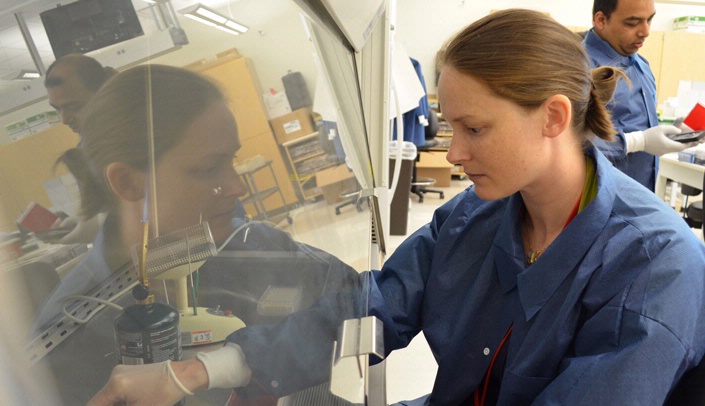A dozen postdoctoral fellows, Ph.D.s and graduate students from institutions such as Harvard, Stanford and the National Institutes of Health took part in a tuition-free workshop held at UNMC last week.
The workshop was designed to provide participants with hands-on experience with the fundamental techniques required to perform molecular genetic studies of the staphylococci. The goal is to maximize the potential of the Nebraska Transposon Mutant Library (NTML) and associated genetic tools that UNMC’s Center for Staphylococcal Research (CSR) has provided to the staphylococcal research community.
“To work with bacteria and to manipulate it at the genetic level requires pretty sophisticated expertise,” said Ken Bayles, Ph.D., associate vice chancellor for basic science research and the director of the CSR, who developed the workshop along with Paul Fey, Ph.D., Jeff Bose, Ph.D., Vinai Thomas, Ph.D., and Marat Sadykov, Ph.D. “The weeklong workshop gives participants the essential information they need to work with staph in the research laboratory.”
|
|
The CSR has a longstanding history of providing important genetic tools to the staphylococcal research community, Dr. Bayles said. The workshop is the next step in that process.
Workshop attendees, who took part in a mixture of lectures and hands-on laboratory exercises, were enthusiastic.
Adam Schaenzer, a graduate student in pharmacology at the University of Wisconsin-Madison, said his lab was working with drug development and staph.
“We want to do some staph genetics and screen the transposon library,” Schaenzer said. “I’m finding this is very useful information.”
Schaenzer said he’d found something valuable in each session of the workshop.
Dave Samuels, a postdoctoral fellow from Georgetown University, did his Ph.D. research in salmonella, which has a different bacterial physiology than staph.
“A lot of the tools that I was familiar with in salmonella, they don’t work in staph,” he said. “There’s a different tool kit you need to use. Our lab doesn’t have an established tradition of working with staphylococcus.
“We felt it was good to have someone in the lab come and learn from the people who design all of these genetic tools so we can do our work more easily.”
Samuels pointed out that the needed information is available, but, with the CSR workshop, Dr. Bayles has put a lot of important information in one place.
” ‘What can I do? What types of tools are available for me? Why isn’t this thing I’m doing working?’ I feel like there are a lot of questions being answered,” Samuels said.
